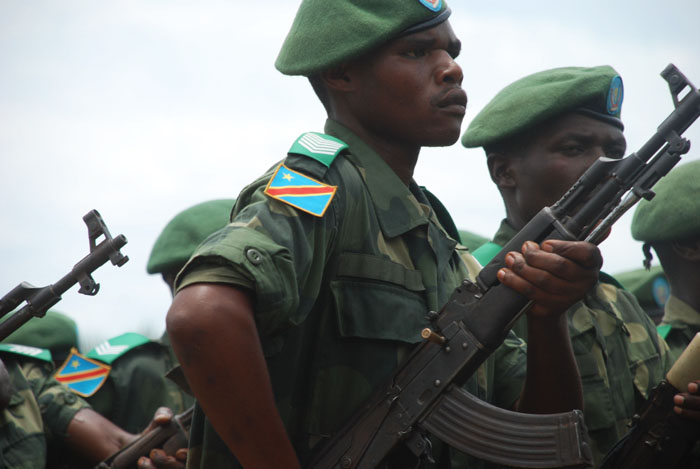
NAIROBI, Kenya — The month-long mutiny orchestrated by Bosco Ntaganda has embroiled relatively peaceful areas of eastern Congo in conflict anew and, amid the uncertainty, reinvigorated some threats that previously seemed to be on the decline, most alarmingly spurring new attacks by the FDLR, as covered by Enough’s Congo research team yesterday.
Details of additional reported attacks continue to turn up. This initial reporting about a particularly deadly recent incident came from Enough’s team in the field today:
On the night of May 13, a group of FDLR rebels attacked Kamananda village in the Bunyakiri locality in Kalehe territory. Bunyakiri is located at 90 km north of Bukavu near the Kahuzi Biega National Park, which is home to gorillas.
The attack reportedly resulted in 31 civilians dead and many more injured. Very angry about the attack and frustrated by the U.N. peacekeepers’ inability to prevent the deaths, on the morning of May 14, local civilians along with the armed group Raiya Mutomboki amassed at the closest MONUSCO Mobile Operational Base located in Kamananda, only one kilometer from where the incident took place. While the Raiya Mutomboki fighters were shooting at MONUSCO Mobile Operational Base, the locals threw stones. In response the peacekeepers started shooting in the air to disperse the mob. This confrontation reportedly resulted in 11 Pakistani peacekeepers injured.
Additionally, the village of Lumenji, also in Bunyakiri, reportedly came under attack by the FDLR a week earlier. Enough will continue to report about these attacks and their aftermath as details emerge.
The rise in FDLR attacks and ongoing upheaval surrounding the Bosco mutiny makes news of new allegations of charges leveled by the International Criminal Court particularly judicious. The Office of the Prosecutor announced yesterday that it requested a new arrest warrant for Bosco Ntaganda, adding the charges of war crimes and crimes against humanity to the existing allegations that he enlisted, conscripted, and used child soldiers (three counts of war crimes).
Building off of the recent verdict in the child soldier case against Thomas Lubanga and evidence presented during the course of his trial, the prosecutor is requesting additional charges for Ntaganda: crimes against humanity of murder, persecution based on ethnic grounds, and rape/sexual slavery; war crimes of intentional attacks against civilians, murder, rape/sexual slavery, and pillaging. The crimes are alleged to have taken place in Ituri between 2002 and 2003.
The prosecutor’s request to add the charges, if granted by the ICC’s Pre-Trial Chamber, helps to whittle away at Kinshasa’s stated rationale for opposing the international court. It begins to disarm critics who say it would be better to try Ntaganda in Congo because a Congolese court could hold him accountable for additional crimes, presumably atrocities committed in the decade since the Ituri conflict. The other justification cited for not moving too forcefully against Ntaganda—that he is a linchpin to peace in the Great Lakes region—is proving a cynical gamble as the mutiny continues and Ntaganda goes deeper into hiding.
The ICC prosecutor also announced its move to seek an arrest warrant for Sylvestre Mudacumura, the top leader of the FDLR’s military wing. Several FDLR leaders are currently under U.N. sanctions, and some are involved in judicial proceedings, but Mudacumura will become the only FDLR leader currently wanted by the ICC if the Pre-Trial Chamber grants the request. (In December 2011 the Pre-Trial Chamber found there was insufficient evidence to confirm charges against Callixte Mbarushimana of the FDLR’s Europe-based political leadership. He was released, and the prosecutor has appealed the decision.)
Mudacumura is wanted for five counts of crimes against humanity and nine counts of war crimes committed between January 2009 and August 2010 by the FDLR in North and South Kivu.
The ICC prosecutor stressed the importance of bringing leaders of these two rebel groups in particular to justice for the sake of stability in eastern Congo. “For too long the populations of North Kivu have been surrounded by violence. They are the victims of crimes committed by different groups: in particular Mudacumura’s FDLR and the CNDP under the command of Bosco Ntaganda," the statement said. "The Kivu provinces are not a prize to be shared between the FDLR-FOCA, the CNDP or others."
While the ICC is pursuing these individuals for past crimes, their presumed involvement in the still unfolding atrocities occurring in eastern Congo underscores the urgency of their apprehension.
Photo: Congolese soldier (Enough / Laura Heaton)

